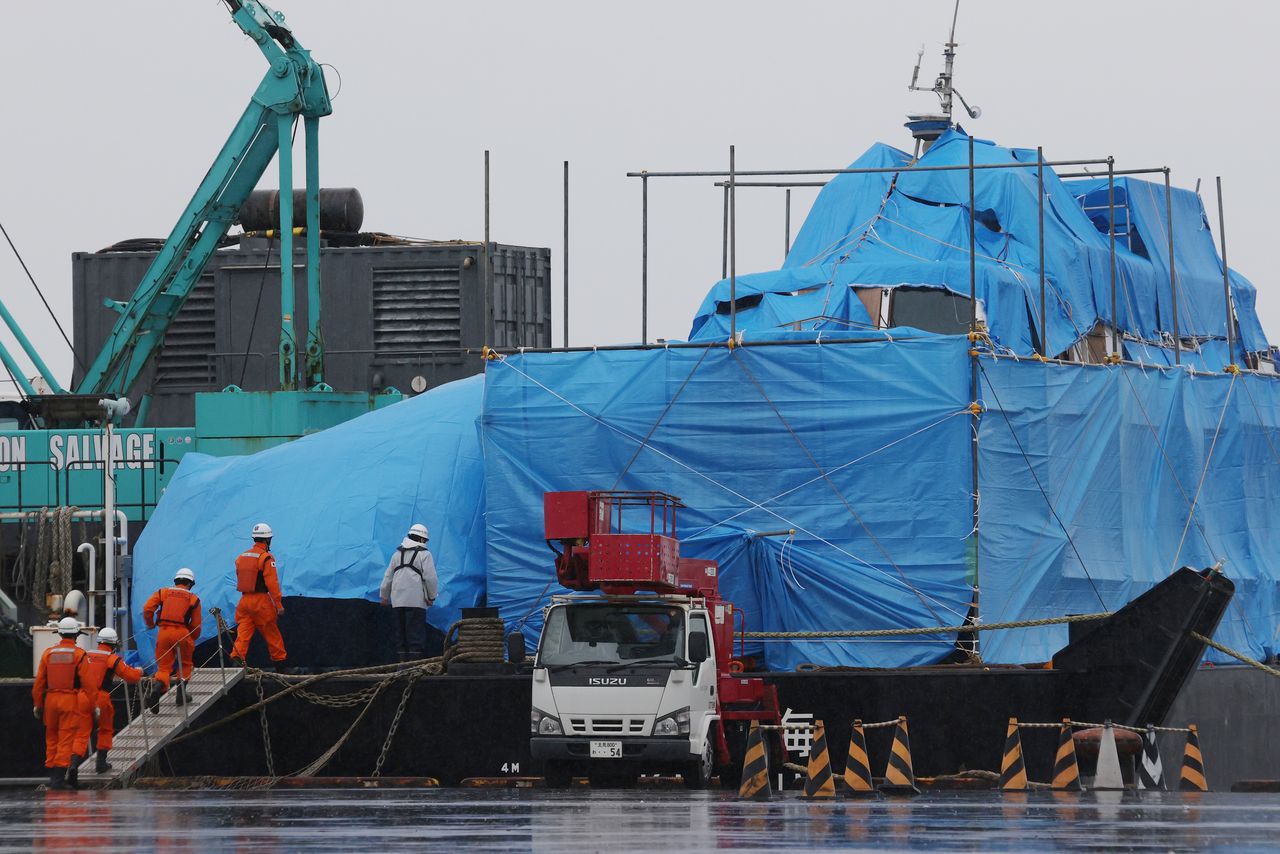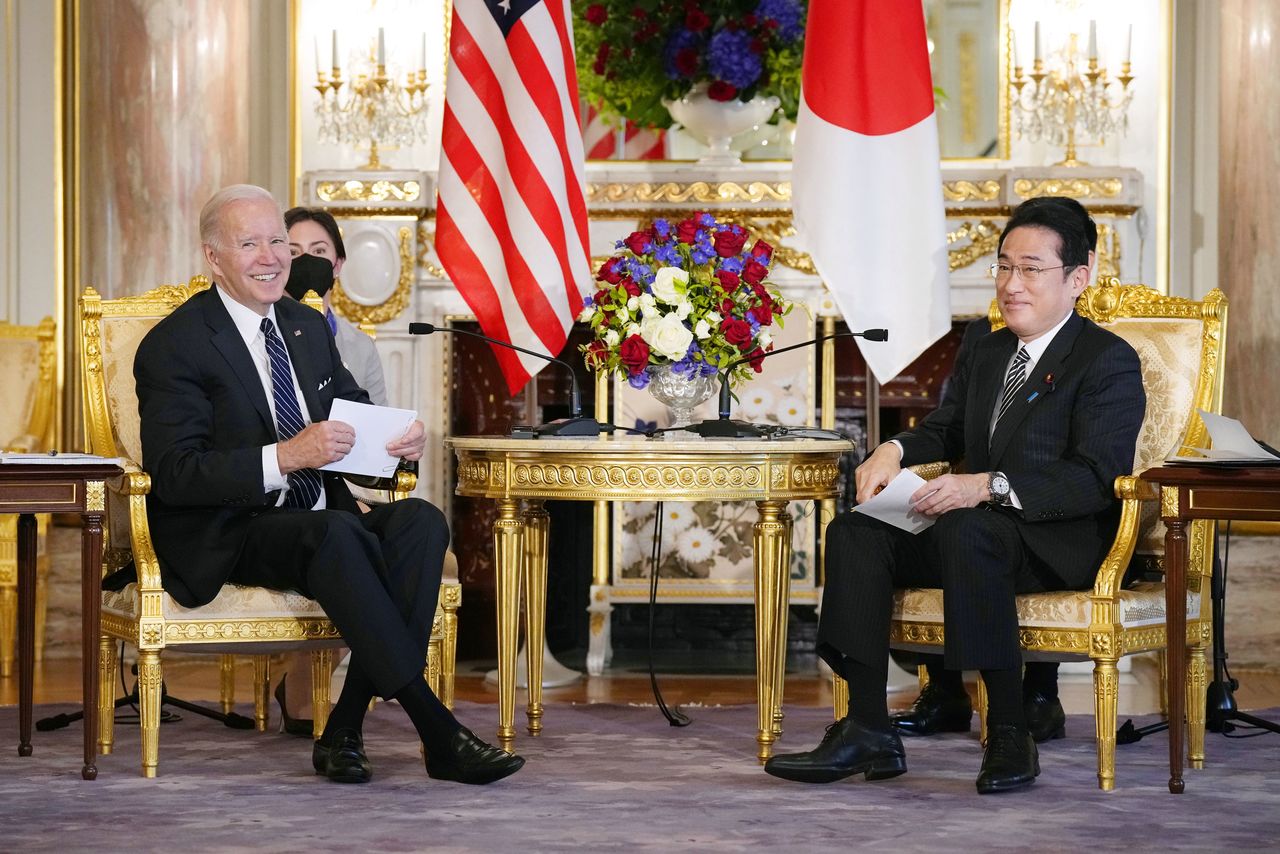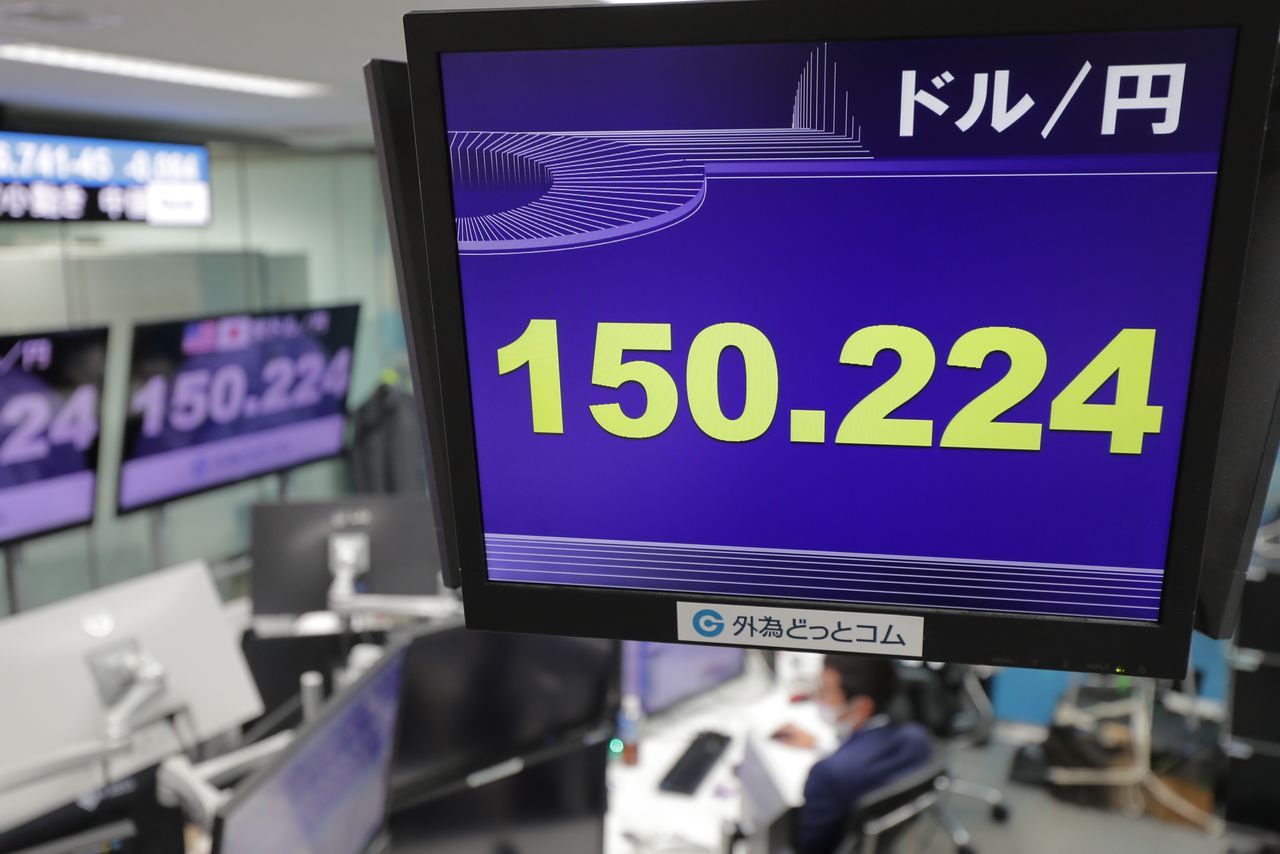Japan: The Top News Stories of 2022
Newsfrom Japan
Society Economy Politics Sports- English
- 日本語
- 简体字
- 繁體字
- Français
- Español
- العربية
- Русский
January
The government implements its first quasi-emergency COVID-19 measures in 3 prefectures on January 9, expanding them to a total of 34 by the end of the month. Measures are not fully lifted until March 22.
Gymnast Uchimura Kōhei, who won three Olympic gold medals in a glittering career, announces his retirement on January 11 via his agency at the age of 33.
February
Nintendo announces on February 3 that it has sold more than 100 million units of its Switch gaming console.
On February 4, the Winter Olympics begins in Beijing, and it continues until February 20. Japan finishes with a record total of 18 medals, its 3 golds won by ski jumper Kobayashi Ryōyū, snowboarder Hirano Ayumu, and speed skater Takagi Miho.
Russia’s invasion of Ukraine on February 24 leads to international condemnation. Japan responds by joining the United States and the European Union in freezing the assets of Russian President Vladimir Putin and other government officials. Prime Minister Kishida Fumio announces on March 2 that Japan will accept Ukrainian refugees. On March 22, Russia’s foreign ministry announces its withdrawal from talks to formally end World War II hostilities with Japan. On April 12, the government announces a ban on imports of 38 goods from Russia, including lumber and vodka, and on April 20, it revokes Russia’s “most favored nation” status.
March
An earthquake centered off the coast of Fukushima Prefecture on March 16 causes shaking of 6 upper on the Japanese seismic intensity scale in Miyagi and Fukushima Prefectures, leading to three fatalities.
On March 22, the Diet enacts a record ¥107.6 trillion budget, including measures for containing COVID-19. It enacts a ¥2.7 trillion extra budget on May 31, with measures intended to counter rising prices.
Drive My Car, directed by Hamaguchi Ryūsuke, wins the Academy Award for Best International Feature on March 27. It is based partly on a story by Murakami Haruki.
April
On April 4, the Tokyo Stock Exchange reorganizes its market structure from four into three new segments: Prime, Standard, and Growth.
Pitcher Sasaki Rōki of the Chiba Lotte Marines throws a perfect game against the Orix Buffaloes on April 10. At 20 years and 5 months, Sasaki is the youngest player to achieve the feat.
On April 23, the Kazu 1, a 19-ton tourist boat traveling around the Shiretoko Peninsula in Hokkaidō, signals to the Japan Coast Guard that it is sinking before contact is lost. On April 29, the Coast Guard announces that it has found the boat on the seabed at a depth of 120 meters. All of the 26 crew members and passengers, including children, have been confirmed dead or remain missing. On December 15, the Japan Transport Safety Board publishes a report finding that seawater came through a hatch that was not fully closed and noting errors made by crew members.

A Japan Coast Guard salvage team (bottom left) investigating the wreckage of the Kazu 1 in Abashiri, Hokkaidō, on May 28, 2022. (© Jiji)
May
Responding to intensified US-China high-tech competition and difficulties obtaining semiconductors during the COVID-19 pandemic, the Diet enacts an economic security law on May 11. It aims to bolster supply chains for important materials, ensure the safety of infrastructure, restrict patent disclosure, and promote research and development of advanced technologies.
The country marks 50 years since Okinawa returned to Japanese sovereignty on May 15 with events in Tokyo and Okinawa.
The government eases recommendations on wearing masks on May 20, saying that they are not necessary outside, even when it is impossible to maintain social distance, in situations where there is little conversation. It also states that they are not needed indoors if it is possible to maintain distance and there is almost no speaking.
US President Joe Biden meets with Prime Minister Kishida in Tokyo on May 23, and launches the Indo-Pacific Economic Framework. The next day, Japan hosts the Quad meeting of Kishida, Biden, Australian Prime Minister Anthony Albanese, and Indian Prime Minister Narendra Modi.

Prime Minister Kishida Fumio, at right, and US President Joe Biden meet in Tokyo on May 23, 2022. (© Jiji)
On May 28, Shigenobu Fusako, former leader of the Japanese Red Army, is released from prison after 20 years. She was convicted for actions including her involvement in the 1974 attack on the French embassy in the Hague, the Netherlands.
June
Inoue Naoya defeats Filipino boxer Nonito Donaire on June 7 to unify the three world titles in the bantamweight class, adding the WBC championship to those for the WBA and IBF.
On June 10, Japan reopens to international tourists after a long closure due to the COVID-19 pandemic, although initially they must be part of organized tour groups. The government raises the cap on daily entrants from 20,000 to 50,000 on September 7, before dropping the cap and restarting visa-free individual travel on October 11, when it also launches a new nationwide tourism subsidy program for residents.
The Japan Meteorological Agency records the first temperature above 40 degrees in June in Japan, as the mercury rises to 40.2 degrees on June 25 in Isesaki, Gunma Prefecture.
Prime Minister Kishida meets for the first time with South Korean President Yoon Suk-yeol alongside President Biden on the sidelines of the NATO summit in Madrid on June 29. At a direct meeting between Kishida and Yoon in Cambodia on November 13, they agree to target a rapid solution to a wartime labor dispute. It is the first official meeting between the two country’s leaders for around three years.
July
Former Prime Minister Abe Shinzō is shot in the back on July 8 while campaigning for the House of Councillors election in Nara, Nara Prefecture. He is pronounced dead at 5:03 in the afternoon. The perpetrator is Yamagami Tetsuya, a former member of the Maritime Self-Defense Force. Yamagami held a grudge against the Unification Church for receiving payments of huge sums of money from his mother and said he carried out the shooting due to Abe’s connection with the church.
The Liberal Democratic Party wins 63 of the 125 contested seats in the July 10 House of Councillors election. Including lawmakers in the LDP, Kōmeitō, Nippon Ishin no Kai, and the Democratic Party for the People, the total number of upper house members who view revising the Constitution favorably is over the two-thirds mark. A record-breaking 35 women win seats, beating the previous highest total of 28 in both 2016 and 2019. On August 10, Prime Minister Kishida reshuffles his cabinet, bringing in LDP leadership rivals Takaichi Sanae as minister for economic security and Kōno Tarō as minister of digital transformation.
Prime Minister Kishida Fumio announces plans on July 14 to have up to nine nuclear plants in operation in the upcoming winter season to eliminate power shortages. On August 24, he shifts his policy on nuclear power, telling a government panel on green transformation to consider the development and construction of next-generation nuclear power plants.
On July 19, figure skater Hanyū Yuzuru announces his retirement from competition, saying he will continue to skate as a professional athlete in ice shows and other events.
On July 26, Tokyo prosecutors search the residence of Takahashi Haruyuki, a former executive of the 2020 Tokyo Olympic and Paralympic Games Organizing Committee, over suspicion that he received a substantial sum of money from business suit retailer Aoki Holdings, which sponsored the games. On August 17, they arrest Takahashi on suspicion of having taken ¥51 million in bribes from the company. They arrest Kadokawa Chairman Kadokawa Tsuguhiko on September 14 on suspicion of bribery. The investigation broadens to cover other major advertising companies like Daikō Advertising and ADK Holdings, and Takahashi is served with a total of four arrest warrants for receiving a total of around ¥200 million.
Foreign Minister Hayashi Yoshimasa and Minister of Economy, Trade, and Industry Hagiuda Kōichi take part in economic two-plus-two talks with their US counterparts in Washington on July 29. They agree to uphold the international economic order.
August
On August 9, Ohtani Shōhei of the Los Angeles Angels becomes the first Major League baseball player to achieve double-digit wins and home runs in a single season since Babe Ruth in 1918.
Japan’s seventh wave of COVID-19 sees daily cases topping 200,000 cases on several days in August, and a new record of 343 daily fatalities on August 23. This follows the initial spread of the omicron strain in the sixth wave from the start of the year, during which daily cases rose above 100,000 for the first time in February. The eighth wave sees a steady climb in cases from October, and 200,000 are confirmed on December 20. As of December 30, there have been more than 28 million total cases in Japan and over 50,000 deaths.
September
On September 8, the LDP announces that 179 of its lawmakers have some kind of connection to the Unification Church. Following the assassination of former Prime Minister Abe, issues surrounding the church had risen to the fore, including its predatory “spiritual sales” and demands for excessive donations.
The Nishi-Kyūshū Shinkansen starts operations between Nagasaki and Takeo Onsen Station in Saga Prefecture on September 23. At 66 kilometers, it is the shortest of Japan’s Shinkansen lines.
On September 27, former Prime Minister Abe’s state funeral is held at the Nippon Budōkan in Tokyo, attended by more than 4,000 people from Japan and around the world. Prime Minister Kishida decided that Abe would have a state funeral on July 22, but issues such as revelations about his connections with the Unification Church led to vocal opposition.
October
Yakult Swallows batter Murakami Munetaka hits his fifty-sixth home run in the last game of the regular season on October 3 to become the first Japanese player to surpass Japanese baseball legend Oh Sadaharu’s single-season milestone of 55 homers. The 22-year-old also became the youngest player ever to claim the triple crown, consisting of highest batting average, most home runs, and most runs batted in.
North Korea launches a ballistic missile on October 4 that passes over Aomori Prefecture, triggering the J-Alert early warning system for the first time since 2017. The projectile travels 4,600 kilometers, the farthest of any North Korean rocket to date, and lands in the Pacific Ocean beyond Japan’s exclusive economic zone. It is one of numerous North Korean missiles launched during tests in 2022, including another that triggers J-Alert on November 3 and an ICBM on November 18.
On October 17, Prime Minister Kishida instructs his cabinet to investigate the Unification Church. On November 22, the Ministry of Education, Culture, Sports, Science, and Technology exercises the right under the Religious Corporations Act to ask questions to the Unification Church, calling for it to report on its management and income. This is the first time the right has been applied under the law. On December 10, the Diet enacts a law to ban organizations from malicious solicitation of donations.
After dropping to 135 against the US dollar on June 13, and 140 on September 1, the yen falls to a 32-year low on October 20, dipping below the 150 level briefly during trading in Tokyo. The government and Bank of Japan make their first market intervention for around 24 years on September 22, buying yen and selling dollars.

A monitor at FX transaction company Gaitame.com in Minato, Tokyo, shows the yen trading below ¥150 to the dollar on October 21, 2022, marking the currency’s lowest level since August 1990. (© Jiji)
Minister for Economic Revitalization Yamagiwa Daishirō resigns on October 24 amid growing criticism over his past ties to the Unification Church. Prime Minister Kishida dismisses Minister of Justice Hanashi Yasuhiro on November 11 over making light of his responsibility to authorize executions, and accepts the resignation of Minister of Internal Affairs and Communications Terada Minoru on November 20 after a political funding scandal. After these successive resignations, the Kishida cabinet approval ratings drop to around 30%. A fourth cabinet member, Minister for Reconstruction Akiba Ken’ya, resigns on December 27.
November
On November 11, Toyota, NTT, NEC, and five other major Japanese companies announce the foundation of a new company called Rapidus for the production in Japan of next-generation semiconductors. It announces on December 6 that it will collaborate with the Belgian research institute Imec, and further announces a partnership with IBM on December 13.
Prime Minister Kishida meets with Chinese President Xi Jinping in Thailand on November 17, in the first meeting between the two countries’ leaders for three years. They agree to work on improving bilateral ties.
Russia’s invasion of Ukraine and the subsequent increases in prices of energy and food, as well as the weakening of the yen, lead to a 3.6% year-on-year rise in Japan’s composite consumer price index (excluding fresh food) for October 2022, released by the Ministry of Internal Affairs and Communications on November 18. This is the highest rise since February 1982.
On November 22, the Ministry of Health, Labor, and Welfare gives emergency approval to the Xocova pill for COVID-19 developed by Shionogi. This is the first oral treatment for COVID-19 developed in Japan.
A UNESCO panel recommends on November 30 that a set of Japanese ritual dances including the traditional bon odori dance and the ritual nenbutsu odori dance be added to its representative list of the Intangible Cultural Heritage of Humanity.
December
Facing continuing North Korean missile tests and the possibility of a Taiwan contingency, on December 5, Prime Minister Kishida orders an increase in defense spending of over 50% to ¥43 trillion over five years from April 2023. This is part of a plan to bring Japan’s defense outlay from around 1% of GDP, or ¥5 trillion per year, to 2%, in line with the country’s NATO partners.
Japan’s men’s national soccer team loses on penalties after a 1–1 draw with Croatia in the round of 16 of the FIFA World Cup in Qatar on December 5. This follows historic victories against Germany and Spain in its group matches.
On December 20, the BOJ widens the acceptable range of yields for 10-year Japanese government bonds from between minus 0.25% and 0.25% to between minus 0.5% and 0.5%.
(Originally written in English. Banner photo: Former Prime Minister Abe Shinzō, second from left, during House of Councillors campaigning in Shinjuku, Tokyo, on June 22, 2022. © Jiji.)